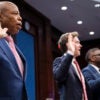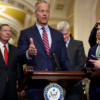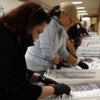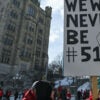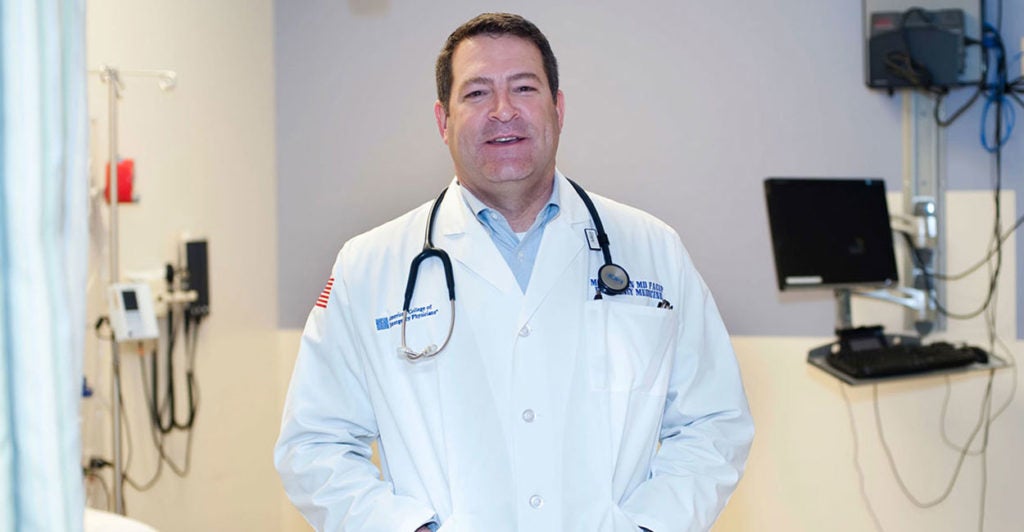Besides being a congressman, Rep. Mark Green, R-Tenn., is an emergency room physician and Army special operations veteran. He joins me today on The Daily Signal Podcast to discuss his perspective on the coronavirus pandemic, what the Senate’s relief package gets right and wrong, and why the U.S. shouldn’t be dependent on China for pharmaceuticals and medical supplies. Read the lightly edited transcript, pasted below, or listen on the podcast:
We also cover these stories:
The Daily Signal depends on the support of readers like you. Donate now
- COVID-19 cases in the U.S. continue to increase.
- Surgeon General Jerome Adams urges Americans to take the “15 days to slow the spread” message seriously.
- Sen. Rand Paul, R-Ky., becomes the first senator to test positive for COVID-19, though he says he remains asymptomatic.
The Daily Signal Podcast is available on Ricochet, Apple Podcasts, Pippa, Google Play, or Stitcher. All of our podcasts can be found at DailySignal.com/podcasts. If you like what you hear, please leave a review. You can also leave us a message at 202-608-6205 or write us at letters@dailysignal.com. Enjoy the show!
Rachel del Guidice: I’m joined today on The Daily Signal Podcast by Congressman Mark Green of Tennessee. Congressman, it’s great to have you back on The Daily Signal Podcast.
Rep. Mark Green: Hey, thanks for having me.
Del Guidice: Given your background in medicine as an emergency room physician, and what’s on the minds and hearts of all Americans right now is the whole coronavirus pandemic, what is your perspective overall on everything that’s going on?
Green: You know, I think, if you’re asking for sort of my overall perspective, I think there are three simultaneous battles being fought.
Of course, there’s the battle against the virus, and inside that world it’s all about getting testing and appropriate equipment out to the troops in the field, so to speak, to doctors and nurses that are out there on the front lines, getting them the PPE [personal protective equipment] and all of that. There’s, of course, the ventilator and the hospital bed issue. That’s all sort of one battle being fought.
The second battle is to preserve the economy in all of this unbelievable turmoil.
As you go to fight the virus and shut things down so that transmission stops, you put a lot of people out of work, and we’ve seen unprecedented. So inside that economic battle is what the House and the Senate and all these bills are being passed in order to get relief to American businesses.
That battle is impacted by the political battle because there is this battle between the two parties, honestly. And in some cases, aspects of it where they’re just trying to one up the other to show who cares the most about the American people, and that battle is impacting the economic battle, and in some cases, maybe even potentially getting in the way of the virus battle.
So those are the three things, the three silos, the three … I’m using the term battle because I can’t find a better word for it.
In terms of the virus, I think we’re making a lot of headway. You know, equipment’s getting out there.
I know I talked to some of the hospitals in my district, and as a physician, as an ER physician, I can go and call ER docs that are buddies of mine in the community and say, “Hey, what’s going on?” And for the most part, here in Tennessee, we’ve got the tests.
We’re a little short on PPE, but they’re getting it. They are making diagnosis. There are some patients that are critical, and we’ve lost I know at least one patient here in Tennessee, but I think, overall, that battle is moving very positively.
If you look at the potential therapeutics from the hydroxychloroquine/azithromax study out of France, and there was also a small study out of Australia and China on that, there’s a lot of potential hope there.
There are other therapeutics. There’s a phase three trial going on with remdesivir out in Washington. I think that’s going to produce some positive results. So, in that space, we’re looking pretty good.
In the economic space, I think the first two stimuluses, the $8.3 billion and then what we think is going to be around $100 million, the supplemental number, too, of course, it had a lot of problems in it.
I could go into that if y’all want, but there’s ongoing fights in the Senate right now to get a third supplemental that would get the really important stuff, and that is cash flow loans through the Small Business Administration to the small businesses.
So that’s sort of a very quick overview with probably a little more detail than you wanted. That’s what I’m seeing right now.
Del Guidice: Yeah, no, definitely. Thank you for that.
I know we’re going to probably drill down into some of those other things more specifically, but looking at the legislation that you mentioned, the CARES ACT that’s being debated right now, we’re recording this on Monday afternoon and everything sort of remains in flux as negotiations continue. But from what’s currently in the bill right now, what’s your perspective on it? And would you change anything that’s in the current bill?
Green: … The Hippocratic Oath is “First, do no harm,” so whatever we do in that package, it’s got to make sure that it doesn’t impact the nation long term. There’s the balancing act of, how do we get cash to businesses? …
And the goal, of course, and I like this piece of the bill—I think there was a version that came out yesterday evening that was about 500 and something pages. In that version, which is the latest version I’ve seen, it had you couldn’t lay your people off.
I had the conversation when I came in today with my wife, who runs two CrossFit gyms, and she’s closed the gyms down. I said, “You know, you can’t lay people off. If this system is going to work, it’s to keep people working and keep people employed.”
So I think every business in America should be told that as quickly as possible, and then that government assistance through the Small Business Administration is going to be there for those businesses that are out there that are having to shutter their doors right now. At least they can keep paying people, paying their mortgages, paying their utilities, etc., etc. And so I liked that piece of it.
In terms of what I would change, I’m very reluctant to just blanket send out checks to people because there are people who need it and there are people who don’t, and it’s not a very good differentiator when you just send everybody a check. So if I could change any piece of it, I would target that more to the people who are really in need.
Del Guidice: Awesome. Thank you for that perspective.
Looking at what we’re seeing—I think the latest numbers out of the CDC [Centers for Disease Control and Prevention] for Monday were that the U.S. had a total of around 33,404 cases and around 400 deaths. … Obviously, more tests have gone out, so more cases are being reported, and that’s why we’re seeing, at least how I understand it, bigger numbers of coronavirus.
But how would you rate the response of President [Donald] Trump, as well as different health care officials from across the country that have been also addressing the nation?
Green: I think the president’s response, as well as the administration response, has been very, very good. There are a couple of things that I think could have been better.
I think the transition to … standing up the private enterprise system for creation of more tests could have happened a little more quickly, and then the FDA [Food and Drug Administration] waiving its regulations on the therapeutic studies.
For example, remdesivir and some of the more research pipelined meds, getting those out there, I think that could have happened a little sooner. I mean, it took the president basically intervening to get the FDA to relinquish some of those regulations. That was good on his part. Not good on their part.
You know, the president … he very early on recognized this as a potential problem and the CDC and those guys were responding. If you go back to the actual timeline, a lot of media doesn’t want to talk about this, but if you look at the real timeline, you see all these things that were happening, but they weren’t in the news because, well, honestly, it was all about impeachment at that time.
And you can even go back and look through various political leaders’ Facebook feeds and Twitter feeds and all that, and nobody’s really talking about it.
It becomes a conversation once the impeachment is over, and while everybody kind of looks up, well, the administration had been working all that time to get stuff going. CDC, getting its emergency operations center and all those things stood up. I mean, that happened within really seven to 14 days of Wuhan, China’s announcement on December the 30th.
So I think the president’s done a great job. There are a couple areas that when we’re done with this, in our after action reviews, we’d call it in the Army, we’ll say, “OK, this has to be fixed for next time and this has to be fixed for next time.”
But even if you listen to Gov. [Andrew] Cuomo, he’s out there saying, “I called the president and the president responded. I called the task force and they responded.”
So I think there’s a lot of good things happening, but there will be lessons learned, and what we can’t do is turn that into a political thing. I mean, this is the first time the nation’s ever experienced anything like this and I just hope and pray that together Republicans and Democrats can address those lessons learned without making them political.
Del Guidice: Congressman Green, looking at the anti-malaria drugs that have been introduced that President Trump is also talking about, how hopeful are you that those will be successful in treating coronavirus?
Green: I’m very hopeful on hydroxychloroquine and azithromax. The study out of France looks very, very hopeful, but it will take more data. But the remdesivir is the true antiviral that has shown promise, and it’s the drug that was created by Gilead for Ebola. They’re in phase three now on that.
I’m hopeful, but I’m very, very hopeful about hydroxychloroquine. I know physicians in the Middle Tennessee area who have patients in the ICU on the ventilator and they’re using it, so I’ve asked for them to kind of keep me up to date because hydroxychloroquine is a drug that’s been around a very long time, and so a physician can write it off label anytime they want to, an M.D. or a D.O. can. And so I think you’re going to see a lot of providers using it, and we’re probably going to get a lot of data.
Del Guidice: So the coronavirus pandemic, amidst a bunch of other things, has lawmakers, as well as Americans across the country, talking a lot about how reliant the U.S. is on China for pharmaceuticals and other medical supplies. … Given what’s happened in this whole situation, do you think we do rely too much on China for medical supplies?
Green: Absolutely. I mean, that is a definitive, absolutely, yes.
And you know, the thing about it is we maintain a military industrial base that is prepared in the event of war. Maybe we’re not buying any tanks today, but right now there’s a plant that makes tank barrels that’s just ready to go whenever we need it because it’s a national security issue.
You can’t rely on, particularly, a potential enemy to manufacture your weapons systems. Right? Well, now that it’s very clear that we have this sort of deficiency when it comes to the health care side. …
By the way, and I’m not asserting that in this case it could be, but it could be a weapon in the future. I’m not saying that’s what this is. Please, I want to be very clear about that. But clearly, something like this could be a weapon in the future.
So we’ve got to kind of start thinking [of] this from a national security standpoint, just like we do with tank barrels or helicopters or that kind of stuff, military weapons systems, and that includes PPE too. Not just the medications, but our protective equipment and all those things that we would need to get through a similar experience like this.
So I know that there’s legislation. In fact, there’s tons of different legislation. [Sen.] Tom Cotton has one, [Sen.] Marsha Blackburn has one, [Sen.] Josh Hawley, on the Senate side. There are House versions of those.
I really like Tom Cotton’s. I haven’t had a chance to read Marsha’s, but I’ll read it. I’ll read all of them, and I’ll pick one and jump on board as a co-sponsor because I think we’ve got to reward businesses that bring that kind of stuff back home.
Del Guidice: Exactly. … So, on Sunday, President Trump talked about it during his press conference and then was also tweeting about the economic downturn the country has seen because of coronavirus, and he had said, “We cannot let the cure be worse than the problem itself. At the end of the 15-day period, we will have to make a decision as to which way we want to go.”
So Congressman, my question to you is, how do you think the country should proceed in the coming weeks recognizing the threat of coronavirus while at the same time being prudent about its implications on the economy?
Green: As I kind of indicated [earlier] … this is about cash flow for businesses, and this is the second stimulus that passed through the House in the middle of the night and had to be redone the following Monday.
That package put requirements on small businesses but didn’t really make them whole. It did a little bit with the payroll tax, immediate deduction from what you have to pay in payroll tax to cover those people that are out sick or taking care of their family, but it’s inadequate. It’s clearly inadequate.
So we have got to get this other bill passed in order to work on the cash flow of businesses to make sure they can pay employees and pay their bills, their fixed expenses to work, and to maintain supply chains.
Beyond that, if we go much beyond that, we have to be very careful about the total amount of money we spend because … what you put into the economy today, you’re taking it out of tax dollars in the future. And very clearly the United States has overspent for some time with a lot of different contributors to that, but we’re not in a debt to GDP [gross domestic product] ratio where we can just throw lots of debt on the country.
So we have to balance this and make sure that the cure, the economic cure to what the businesses have taken as a hit, because they’re out there trying to stop the spread of the virus, isn’t so overdone that it bankrupts the future of the country.
That’s the balancing act that I alluded to earlier, and the piece that I’m very comfortable with is the cash flow support through loans to the businesses, but I’m struggling with the indiscriminate writing of checks, if that makes sense.
Del Guidice: Yeah, no, thank you for your perspective.
Earlier in our discussion, you had talked about your colleagues in medicine who are meeting this crisis head-on, and so I’m curious, what are you hearing from any colleagues who are doctors, friends of yours that you might be talking to? And then just practically speaking, do they have enough supplies like masks and ventilators, and what are things that they might need that you’re hearing?
Green: Yeah, I think the challenge is not so much the masks, at least in Middle Tennessee. I spent all day Sunday connecting even colleagues in Kentucky, New York, and Michigan with vendors who I knew had masks. So the question wasn’t as much the availability of the mask, although that is part of it.
Perhaps the bigger and more challenging piece is, how do you track who has it and who doesn’t? For example, if you were in a combat situation and your battalion was fighting across an enemy front and the enemy attacked over here at A Company, A Company would expend all of its ammunition, almost all of its ammunition, fighting that enemy. So you win that particular battle.
While the enemy’s preparing to counterattack again or attack again, you cross-load the ammunition. So you go to B Company and C Company and you say, “Hey, A Company needs some ammo.” …
We don’t have that system created. We’ve never thought, “Well, hey, Vanderbilt’s short masks. UT Knox Med Center, you’ve got masks but you don’t have face shields. Let’s do a quick swap.” That system isn’t there and the states are having to create that.
I know I spoke to our governor and they built that system so that someone can be sort of the central command center and, “Oh, wait, OK. Here, we’ll cross-load this, and you drive over and get masks from them, and we’ll drive over and get face shields to you.”
So that piece of it is another lesson to learn, is just there’s got to be a quarterback, or in the Army we would call it the tactical operations center, who’s out there quarterbacking where everything goes so that you are cross-loading appropriately. I guess that’s just a blending of my military experience and my medical experience, but that piece is the real challenge today.
Del Guidice: Thank you for that. And speaking of lessons learned, when it comes to looking at all of this from more of an international perspective as well, do you think the U.S. has anything in particular learned from how COVID-19 has affected other countries?
Green: Yeah. … I think the president was on top of this, just something we did better than others. If you compare how we shut our borders to Italy, you will absolutely see the flattening of the curve, and we have flattened the curve somewhat. Now, we don’t know exactly how much.
Some governors have taken the extreme of completely shutting their states down. You know, that’s the balancing act, right? Between stopping spread and shutting down the economy.
So all that is in balance. But we did it much sooner than they did in Italy, and if you compare and contrast, I mean, they did reach the maximum capacity of their ventilators, and they did have to make the horrible choice in their algorithm of who got treated.
And so far, so good. We haven’t reached that point in America. That’s not to say we won’t, and it’s not to say that in regions of the country we will and others we won’t.
I don’t want to make predictions on it, but shutting the border, closing the border to Europe when we did, all of those decisions were timely and I think have been effective in somewhat flattening the curve. That’s certainly better than, say, Italy.
Del Guidice: Yeah. It’s really interesting how important borders have become all of a sudden through all of this. So it’s [an] interesting, interesting time.
… There’s a lot of hysteria. There’s a lot of people that are nervous. And then there are a lot of people too who are helping their neighbors, who are working together. Given your background in medicine and also as a lawmaker, working on the front lines to represent your constituents in Tennessee, what would you say to Americans today that are still taking all of this in?
Green: Well, first, I think the thing I would say is we still have to be vigilant with our precautions, our health care precautions—hand sanitizer, washing your hands. We do need to adhere to the rules on essential people being out, and where states have limited it, people should take the lead from their local leaders and their state leadership.
But I think Americans should know that the vast majority … of the people who get COVID-19 are going to be fine, and that it’s still important to know the targeted populations, the ones that have comorbidities and the elderly, are the ones that are really getting sick, although there does seem to appear just recently some slight increases in the younger people getting into critical condition.
We have a 31-year-old on the ventilator here in my local town, so it still can strike the young, but the vast majority of people will be OK.
We will get through this. The president and the states and local governments are seeming to work very well together, and this will pass, and then we’ll need to go out and make sure that we do everything we can to get the economy roaring again.
Del Guidice: Well, Congressman Green, thank you so much for being with us again on The Daily Signal Podcast. It’s always great to have you on.
Green: Thanks. Thanks for having me on.






